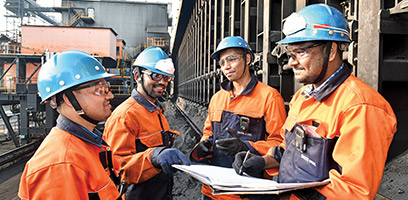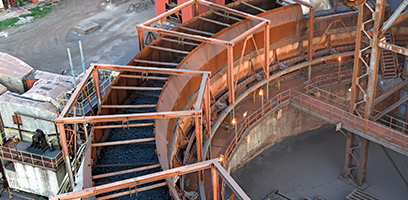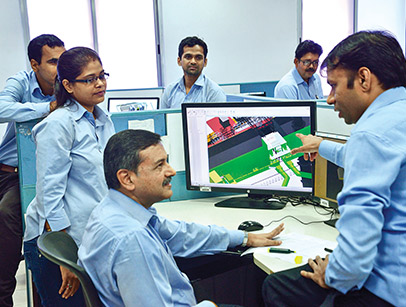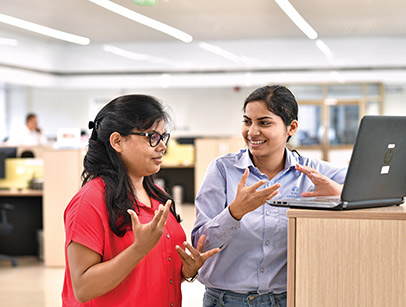At Tata Steel, we are in constant pursuit of minimising our environmental footprint and conserving the natural environment around us. Our philosophy of resource efficiency guides our investment decisions to monitor and mitigate the impact of our operations.

Tata Steel aims to achieve emission intensity <2 tCO2/tcs by 2025. We continue to implement Internal Carbon Pricing in our capital expenditure appraisal process with the shadow price of carbon at US$15/tCO2.
Highlights of our CO2 emission reduction projects:
Carbon Capture and Use (CCU) at TSJ and at the Ferro Chrome plant at Bamnipal, Odisha
Assessment of renewable energy potential across our locations in India
Maximisation of scrap utilisation in steelmaking
2.34 tCO2e/tcs
GHG emission intensity

24 projects implemented in FY 2018-19 to upgrade the existing air pollution control equipment, including upgradation of all Electrostatic Precipitators (ESPs), at the sinter plant
Commissioning an online monitoring system in all major stacks
0.42 kg/tcs
DUST EMISSION INTENSITY
TSJ is the Indian benchmark for CO2 emission intensity at 2.29 tCO2/tcs and energy intensity at 5.67 GCal/tcs for steel production through the Blast Furnace Basic Oxygen Furnace route.
One of the top 7 integrated steel companies globally in CDP 2018
Tata Steel Bara Tertiary Treatment Plant won the ‘Industrial Water Project of the Year 2019’ Award presented by the Global Water Intelligence (GWI)

<2 tCO2/tcs GHG emission intensity

Invested in Sewage Treatment Plant (STP) and Rainwater Harvesting (RWH) structures at various locations to improve the groundwater table
Commissioned a 25 MLD tertiary treatment plant at Bara STP to convert sewage water of the Jamshedpur township into processed water for reuse in Jamshedpur Steel Works
3.5m3/tcs
Specific water consumption
One of the top 7 integrated steel companies globally in CDP 2018
Tata Steel Bara Tertiary Treatment Plant won the ‘Industrial Water Project of the Year 2019’ Award presented by the Global Water Intelligence (GWI)

<2 tCO2/tcs GHG emission intensity

Steel is 100% recyclable and we are setting the bar in the industry with our steel recycling business that will help meet the growing demand for steel in a sustainable manner. It will formalise the scrap market in India and help the country transition to a scrap-based steelmaking route for a more sustainable future.
Recovered metal from steel slag is utilised in the steelmaking process and this scrap is used in steel melting shops, along with clean scrap and pooled iron.
Tata Steel handles ~17 MnTPA of by-products, which is converted and sold across 20+ product categories every year.
Granulated blast furnace slag is 100% utilised in Portland slag cement making. Tata Steel has developed and launched India’s first ever LD slag branded products – Tata Nirman (for construction application) and Tata Aggreto (for building roads).
0.78m3/tcs
Effluent discharge intensity
99%
Total solid waste utilisation
Continue investing in technologies to achieve the highest environmental performance standards
Sustain LD slag utilisation at 100%
Ensure no net loss of biodiversity at our mining locations






While Tata Steel’s current operations in India are not located in any of the identified biodiversity hotspots or protected areas, our mining operations (being extractive in nature) impact the flora and fauna in the region.
Therefore, we voluntarily partnered with the International Union for Conservation of Nature (IUCN) at our raw material locations in Jharkhand and Odisha for the implementation of biodiversity management plans.
100%
Total raw material sites covered under biodiversity management plan
Continue investing in technologies to achieve the highest environmental performance standards
Sustain LD slag utilisation at 100%
Ensure no net loss of biodiversity at our mining locations





Our inclusive programmes give us the opportunity to work with and help communities flourish with us. We have partnered with various organisations and will continue to deepen our engagement with communities.

Maternal and New-Born Survival Initiative (MANSI) works with pregnant women, mothers and children to reduce infant mortality.
FY 2018-19 outcomes
Infant mortality reduced in 12 blocks of Odisha and Jharkhand
Real-time digital tracking system launched to provide vital support to health volunteers to respond to high-risk cases
~1,855
high-risk child and mother cases identified
~44%
reduction in death rate achieved
Regional Initiative for Safe Sexual Health by Today’s Adolescents (RISHTA) educates adolescents on the importance of nutrition and their rights, while imparting life skills training.
FY 2018-19 outcomes
Reached out to 15,000+ adolescents
~990+
peer educators developed from adolescent population
HIV-AIDS and leprosy interventions, together with the LEPRA Society, spread awareness about the diseases and provide treatment and rehabilitation to concerned patients.
FY 2018-19 outcomes
~1,905
leprosy cases availed awareness, treatment and rehabilitation, including 31 surgeries
Outreach clinical healthcare services invests in Mobile Medical Units (MMUs), health camps, cataract screenings, surgeries and provision of eyeglasses.
FY 2018-19 outcomes
3,800+ cataract cases operated
2,400+
surgeries conducted by Mobile Eye Surgical Units
Drinking water intervention installed and repaid drinking water facilities, such as hand tube wells, deep bore wells and piped drinking water, and involved work on solar-powered drinking water projects
FY 2018-19 outcomes
Enabled clean water supply to five villages throughout the year, by preventing contamination of natural perennial springs
1.2 lakh+
beneficiaries touched

Thousand Schools project facilitates education for children, through better teaching and learning methods, while improving school governance through School Management Committees.
Learning Beyond School is a fully-community-managed education resource centre that enables children to learn beyond school hours and become familiar with digital technology.
FY 2018-19 outcomes
1,170 schools covered in Odisha and 248 in Jharkhand
1,600+ habitations have become Child Labour-Free Zones, out of the total 2,239 being addressed in Odisha (since the project’s inception)
1,50,000+
students covered in Odisha and Jharkhand
Residential camp schools, known as Masti Ki Pathshala, cater to children who are either dropouts or from vulnerable backgrounds engaged in child labour.
Saving Lost Childhood programme aims to reduce child labour in Jamshedpur.
FY 2018-19 outcomes
3 new Masti Ki Pathshalas created in Jamshedpur – 4 schools catering to 50 girls and 260 boys
Pipla School in Jamshedpur catering to ~100 girls from nearby areas who require bridging and mainstreaming to formal schools
90+ students received scholarships under Tata Steel Scholars’ Programme for Jharkhand and Odisha
3,000+
Students received scholarships under Jyoti Fellowship in Jharkhand and Odisha
Child education for Particularly Vulnerable Tribal Groups (PVTG) provides access to quality facilities.
FY 2018-19 outcomes
~260 students enrolled in seven residential English-medium schools in FY 2018-19, most of them first-generation learners from PVTG families
Literary meets/fests in Kolkata, Ranchi, Bhubaneshwar and Mumbai.
FY 2018-19 outcomes
Acted as top knowledge platforms for intellectual exchange and attracted literary enthusiasts from all corners of the globe

Improving >2 million lives

Technical education institutesimprove employability of the youth in our community through professional skilling courses.
Ek Pahal is a skilling initiative to constructively engage prison inmates by imparting in-house training to enable them to secure gainful employment, both within and outside the jail.
Digital skills for rural children imparted through a classroom-on-wheels, Kaushalyan, using an air-conditioned bus with workstations, an LED TV display as well as a trained computer faculty.
Nursing programmes to help address the issues of poverty, unemployment and mass migration through nursing training.
FY 2018-19 outcomes
~4,800
reduction in death rate achieved
~2,500
youth trained
~2,000
youth placed/self-employed
Women Self-help Groups (SHGs) created in our communities to help impart skills and empower them to run an enterprise.
FY 2018-19 outcomes
~10,000
women empowered through SHGs in 95 gram panchayats
Improve agricultural productivity by investing in enhanced irrigation facilities for the community, waste land development and other allied activities
FY 2018-19 outcomes
20,000+
farmers benefited through agriculture productivity techniques and allied activities
~85
ponds constructed/repaired in Jharkhand and Odisha for agricultural and domestic use

Empower youth by training stakeholders and providing them access to unparalleled sports facilities and nurturing sporting talent with career potential.
FY 2018-19 outcomes
40,000+
youth engaged through different sports activities
Jamshedpur FC (formerly, Tata Football Academy) was established under the aegis of J. R. D. Tata, to promote local youth participation in sports.
FY 2018-19 outcomes
Reached the quarterfinals of the Super Cup in April 2018

Samvaad serves as an international platform for discussion among tribal communities.
FY 2018-19 outcomes
6
regional editions of Samvaad held across India
1,680 tribals
representing 99 tribal communities, delegates from 27 Indian states and 17 countries attended the Samvaad 2018 event
Preserve literary and cultural tribal heritage in partnership with 12 tribal organisations.
FY 2018-19 outcomes
~16,480 students
of Jharkhand and Odisha enrolled in 317 language centres providing instructions in six tribal languages
Rhythms of the Earth
a pan-India tribal musical group comprising 75 members from five states covering 14 tribes was launched
Encourage and promote tribal sports.
FY 2018-19 outcomes
~4,200 tribal youth
of Jharkhand and Odisha were engaged through tribal sports
Establish district models in improving access to quality education and healthcare for infants, mothers and adolescents
Continue to engage with tribal communities and nurture leadership potential among tribal youth
Explore partnerships with governments, social sector organisations, academia, experts and other organisations in the national and international development space
Adopt innovative ways of enhancing household income, community nutrition, completion of basic education till matriculation by all; dealing with endemic water deficiency, supporting the differently abled and enabling better self-governance among citizens at the Panchayat level






Investing in people, striving to be the employer of choice, while creating a safe and healthy workplace constitute key priorities for Tata Steel. Industrial harmony of 90-plus years and a century-old trade union is a testament to our culture of ‘working together’.
32,984 employees
on roll (india)
49% reduction
in lost-time injury frequency rate (ltifr) between FY 2008-09 and FY 2018-19
~6.5% women
in the workforce

We have instituted policies that drive a culture of safety consciousness and prevention across our entire operations. Our commitment is reflected in the successful ramp-up of the Kalinganagar facility while maintaining the best practices in health and safety.
Leadership capability building at all levels to achieve zero harm and promote a safety-positive behaviour
FY 2018-19 outcomes
~26%
reduction in high potential incidents
Elimination of safety incidents on road and rail to achieve safe, efficient and smart transport
FY 2018-19 outcomes
Zero fatalities inside plant premises sustained between FY 2014-15 and FY 2018-19
56% y-o-y reduction in road Lost Time Injury
Competency and capability building to mitigate hazards and manage risks
FY 2018-19 outcomes
1,201 officers trained on recalibrated risk matrix
2,928 opportunities for improvement identified through cross-functional audits
Contractor safety risk management to engage and empower the sizeable contract workforce
FY 2018-19 outcomes
1,035 vendors assessed via a contractor competency audit
12,366 contract workforce trained and certified

25% diversity in workforce
Process safety management to ensure effective control of risks at high-hazard operations
FY 2018-19 outcomes
1.2%
improvement in health index
56% high-risk cases (related to lifestyle diseases) transformed to moderate or low-risk
10 hazard control projects
12 ergo control projects implemented


We have implemented the Employee Productivity Framework across our facilities and we continue to identify redundancies through programmes such as right skilling, Sunhere Bhavishya Ki Yojna and a job-for-job scheme.
We are making significant progress in simplifying the organisation structure, systems and communications.
We also have a Workforce Capability and Capacity Framework to assess capability needs across the workforce for skill and competence building, customer focus, organisational performance, innovation, health and safety, and environment and business ethics.

800 tcs/employee/year
in the workforce
₹132.87 crore
invested in employee training and development

MOSAIC, our marquee initiative, covers four aspects: Gender, Person with Disabilities (PwDs), LGBTQ+, and other marginalised sections of the society. Through this initiative, we are inducting female engineers in manufacturing, sensitising employees about diversity and inclusion, retaining and developing diverse talent, creating infrastructure to simplify lives of working parents and members of the workforce with special needs.
With the objective of enabling greater flexibility and empowering our people, we provide paternity leave for blue-collared workers, offer project-based and full-time roles to women willing to return to work after a hiatus, facilitate satellite office operation for those with location constraints, provide menstrual leave without approval to those that require it, provide adoption leave to single male and transgender employees, and so on.
~17%
employees from the affirmative action community
Improve employee productivity
Be one of the best places for people to work
Zero fatality
2% improvement in health index year on year



